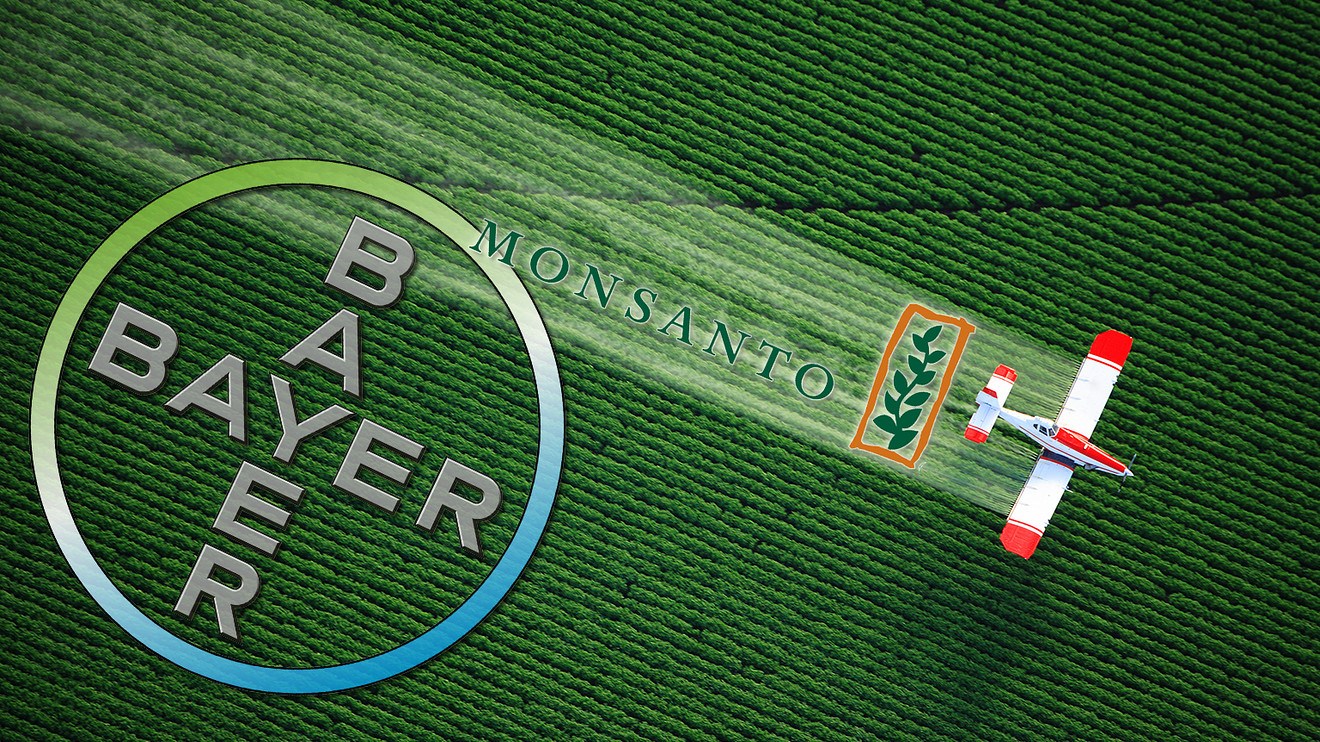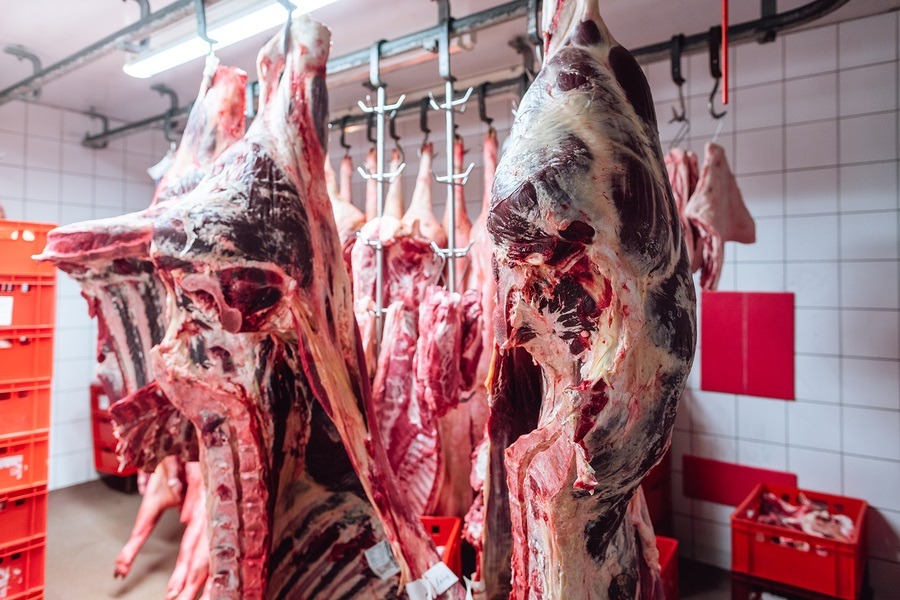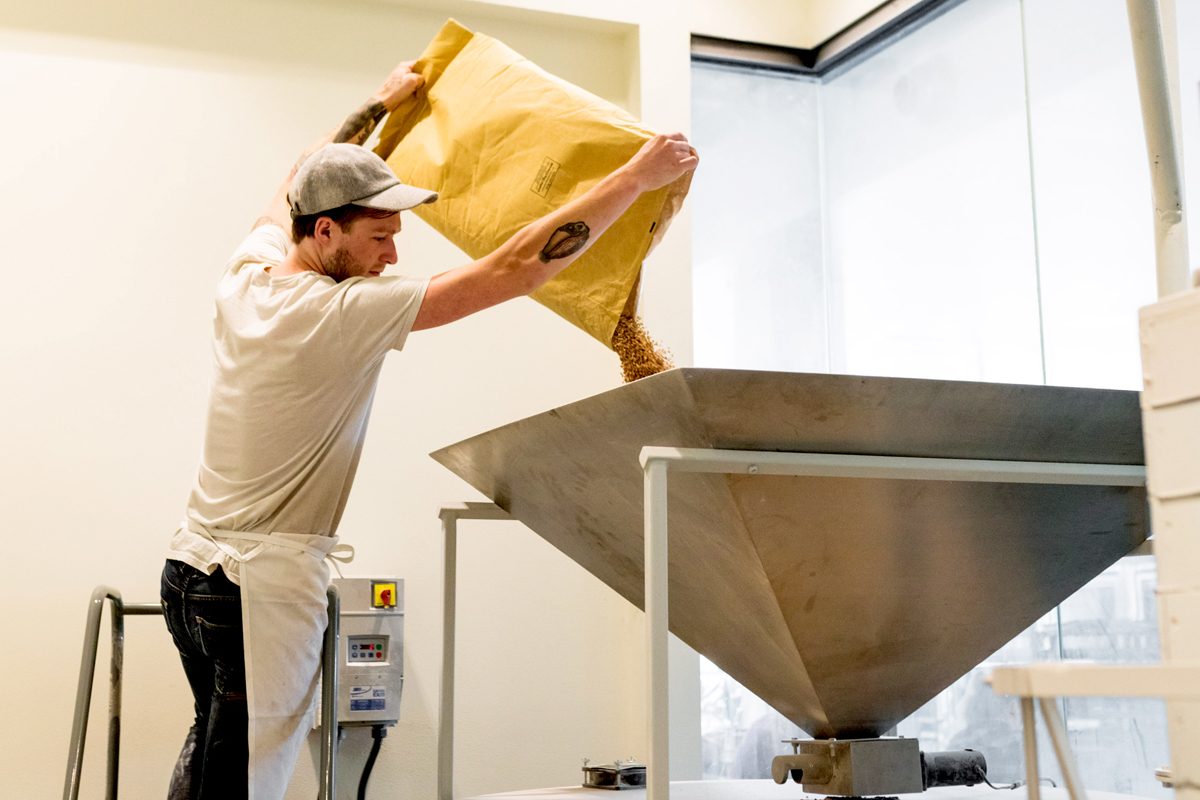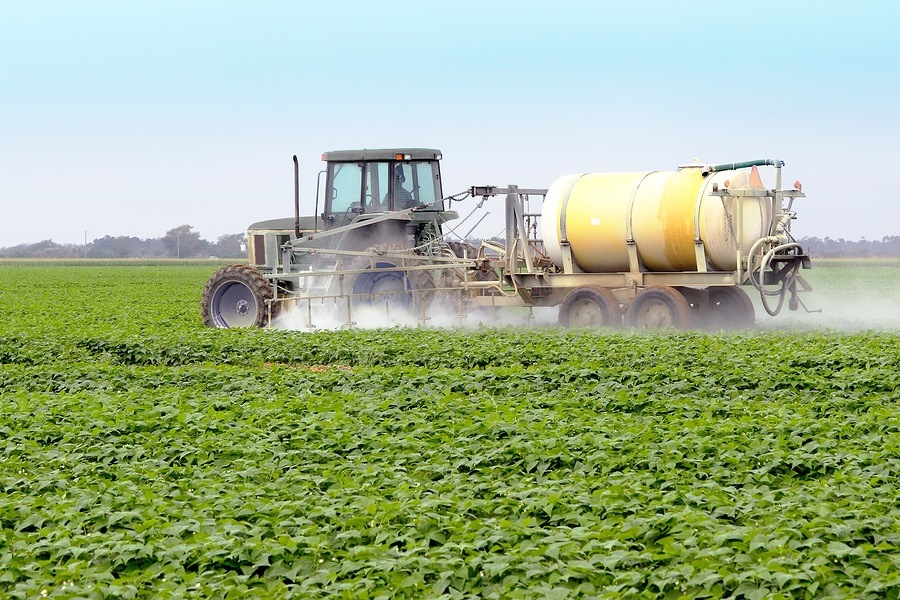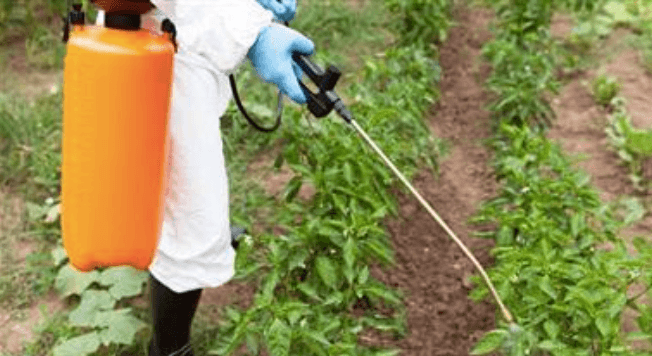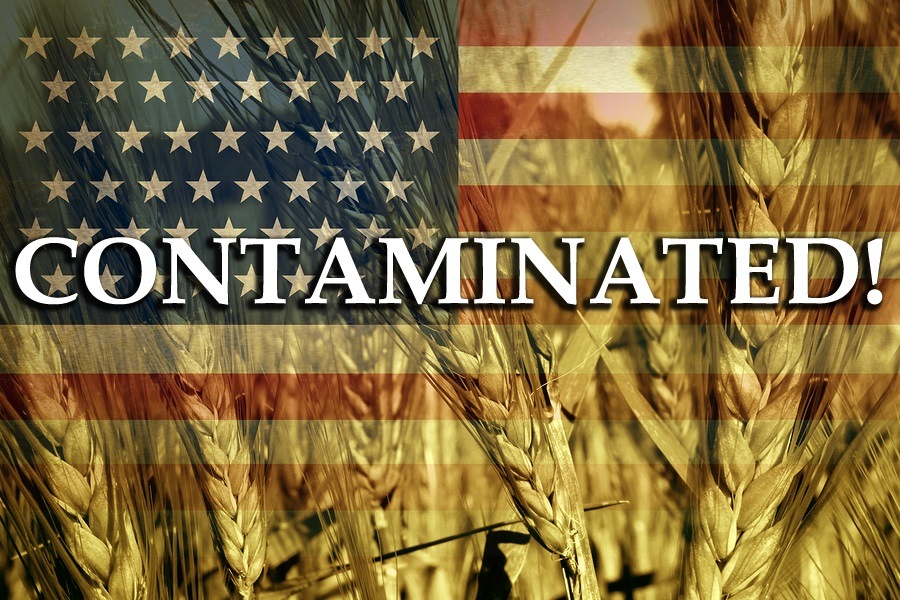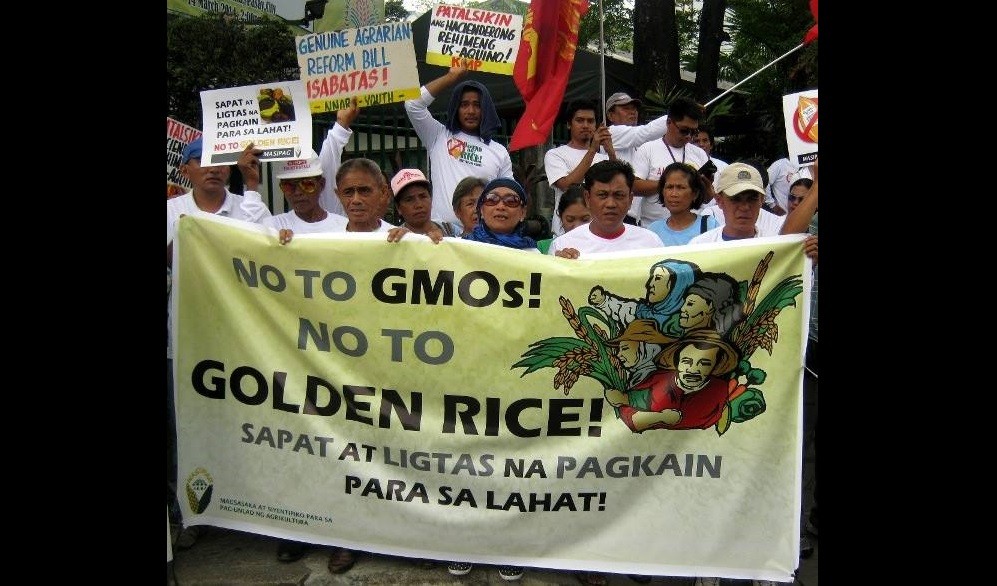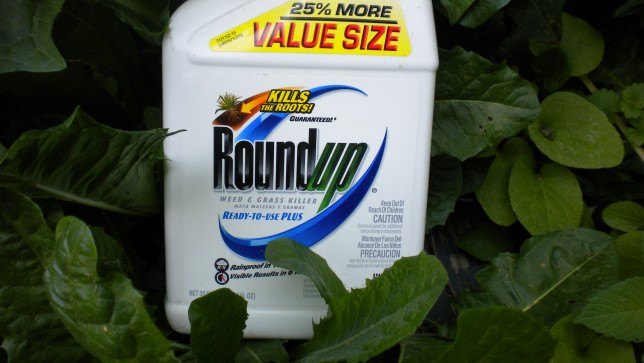News regarding the dangers of GMOs and biotech, and the advantages of organic sustainable agriculture.
The “Canary in the Coal Mine” Just Died, Are we Next? Dane Wigington Continues to Expose the False Climate Change Narrative with Facts
Dane Wigington of Geoengineeringwatch.org has just published the second installment of short videos titled: Into The Wild, With Dane Wigington. In his first video last week, Wigington explained how neither the Right nor Left versions of the cause of fires currently burning were entirely correct. The Political Left wants us to believe this is the cause of Climate Change which needs further government intervention, while the Political Right is claiming that we have not been cutting down enough trees, and that this is all due to arsonists. Each side has an element of truth, but the underlying cause is Geoengineering, by creating artificial clouds (chemtrails) to try and engineer climate change. In his second video just published this week, Wigington deals with the massive amounts of frogs dying in northern California, just a few feet away from bodies of water, water that would probably have saved them if they had just been able to cover those few feet to reach the water. He states: "Frogs are a harbinger species, 'the canary in the coal mine', and they are dying. The warning signs from nature are everywhere, yet few seem to notice. Have we become the proverbial frogs in boiling water? Will the fate of the frogs soon become our own? This is the second installment of 'Into The Wild.' Flora and fauna are dying and burning all over the world, covert climate engineering operations are a core causal factor. All are needed in the critical battle to wake populations to what is coming, we must make every day count. Share credible data from a credible source, make your voice heard. Awareness raising efforts can be carried out from your own home computer."
West Coast Fires: The Forests Are Dying Due to Geoengineering – If the Forests Die, We Will Die
We are currently seeing unprecedented numbers of forest fires along the West Coast of the United States. The sheer volume of fires and acreage involved is something that has never been seen before. And while some are starting to report that arsonists have been arrested in some locations which may point to a planned operation to start these forest fires, the real underlying cause for these fires is largely NOT being reported by the media. The official government position is that we just have not been cutting down enough trees, and that most of these fires are "natural," being ignited by lightning or other natural causes. Others point to climate change, which fits into the UN New World Order sustainable goals. And while both of these may be contributing factors, others, like Dane Wigington of Geoengineeringwatch.org in Shasta County, California, are claiming that these fires are the result of Geoengineering, the Globalists' plan to modify weather patterns by creating artificial clouds, commonly known as "chemtrails." He states: "The decay of the forest, the demise of the forest, is not being acknowledged by the agencies, the agency officials, and the administration itself that have tried to falsely claim that the reason California's fires are burning is because we just aren't cutting down enough trees. That's a blatant glaring criminal lie. The forests are burning because they are dead and dying.... Toxic soils, extremely extended periods without precipitation because of the climate engineering operations. Cutting off precipitation before it can enter the U.S. West Coast - we see this on satellite imagery. It's not speculation or theory. And so the forest is completely imploding around us. And if the forests die, we will die."
Total Global Dominance: Gates Foundation is Destabilizing Africa’s Food Economy
The same Gates Foundation which is behind every aspect of the COVID-19 pandemic from financing much of the WHO budget, to investing in favored vaccine-makers like Moderna, is engaged in a major project in Africa which is destroying traditional small farmer production of essential food crops in favor of monoculture crops and introduction of expensive chemical fertilizers and GMO seeds that are bankrupting small farmers. The project, the Alliance for a Green Revolution in Africa (AGRA), is directly connected with key global institutions behind the World Economic Forum’s Great Reset. If we know the actual history of the Rockefeller Foundation and related tax-free undertakings of one of the world’s most influential families, it is clear that in key areas the Bill and Melinda Gates Foundation has inherited the Rockefeller agenda from the medical industrial complex to education to agriculture transformation. The Bill and Melinda Gates Foundation, working in tandem with the closely allied Rockefeller Foundation, is not only at the center of the orchestration of unheard-of severe economic lockdown measures for the much-disputed COVID-19 illness. The Gates foundation is also at the very center of the UN Agenda 30 push to transform world agriculture into what they call “sustainable” agriculture. During the global grain crisis of the mid-1970’s then-US Secretary of State Henry Kissinger, another Rockefeller protégé, allegedly declared, “Who controls the food controls the people.” The globalization of world food production and creation of agribusiness, first guided by the Rockefeller Foundation and today with the Gates Foundation taking a more visible lead, is perhaps the most threatening factor to world health and mortality, far more than any coronavirus has shown. Notably the same people promoting fear and lockdowns for that putative virus are busy reorganizing world food production in an unhealthy manner. It seems to be no coincidence as Bill Gates is a known advocate of eugenics and population reduction.
Largest Settlement in Pharma History: Bayer-Monsanto Agrees to $10B Settlement With Victims Poisoned by Roundup Weedkiller
Bayer will dole out between $10.1 billion and $10.9 billion—the single largest settlement in pharma history—to put an end to thousands of lawsuits tied to its acquisition of Monsanto and glyphosate-based Roundup. The $10 billion settlement will be apportioned to four leading plaintiffs’ law firms, who will in turn distribute the money to nearly 100,000 clients who were stricken with cancer after prolonged use of the toxic weedkiller. The German company acquired the St. Louis-based agrochemical giant Monsanto in 2018 for $63 billion, and inherited liability in thousands of lawsuits filed by people who claim exposure to Roundup and its main ingredient glyphosate was the cause of their cancer.
Roundup Cancer Attorney Pleads Guilty to Extortion Attempt
A Virginia lawyer who helped represent the first Roundup cancer plaintiff to take Monsanto to trial pleaded guilty on Friday to trying to extort $200 million from a chemical compound supplier to Monsanto. Timothy Litzenburg, 38, admitted to a scheme in which he and another lawyer threatened to inflict substantial “financial and reputational harm” on the supplier unless that company paid the two attorneys $200 million disguised as a “consulting agreement.” According to the U.S. Department of Justice, Litzenburg allegedly told the company that if they paid the money, he was willing to “take a dive” during a deposition, intentionally undermining the prospects for future plaintiffs to try to sue. Litzenburg claimed to be representing roughly 1,000 clients suing Monsanto over Roundup cancer causation allegations at the time of his arrest last year.
As U.S. Faces Meat Shortages, Pork Exports from the U.S. to China Increase
Last week (April, 2020), we published a report on the state of America's hospital system in the midst of the Coronavirus outbreak, and I wrote then: "The so-called Coronavirus pandemic crisis is very quickly taking a back seat to more serious crises in the U.S. right now, and perhaps none more critical than the closure of hospitals and emergency rooms, along with doctors and nurses being laid off, which is happening all across the country." The other crisis facing the U.S. right now that may soon dwarf the Coronavirus "crisis" is the nation's looming meat shortage. The nation now faces meat shortages, America's primary source of protein, as processing plants across the country have shut down or reduced operations. 80% of the U.S. meat processing plants are owned by only 4 companies. Some grocery stores have already begun to limit meat purchases in advance of the expected shortages. At recent White House Coronavirus Task Force Press briefings, the nation has heard President Trump boast about how he had brokered a trade deal with China back in January of 2020, that includes China buying $12.5 billion of American agricultural products. Trump has been highlighting this as a great deal for American farmers. So which agricultural products did China choose to increase in purchase and export to China after Trump negotiated the trade deal between the two countries back in January? Pork seems to be at the head of the list. China has had major pork supply problems since last year (2019), due to an outbreak of "African swine fever." Some estimates claim that about two-thirds of China’s swine herd has been lost to the disease. So being forced by President Trump into purchasing agricultural products as part of his trade deal, it is no surprise that pork is at the top of the list of exports China wanted. U.S. livestock reports for last week (last week of April, 2020) show a five-week high in U.S. pork exports to China. "The U.S. Department of Agriculture reported export sales of U.S. pork in the week ended April 23 at 50,300 tonnes, a three-week high. China was the top buyer, booking 35,138 tonnes, while actual pork shipments to China totaled 20,683 tonnes, the most in five weeks." As U.S. pork sales soar due to the growing export market to China, U.S. customers are having an increasingly difficult time finding pork in their grocery stores, which may soon be bare of any pork products at all. One has to wonder who got the better end of this trade deal with China?
With Meat Shortages Looming Renewed Calls to Repeal Federal Ban on Sale of Meat from Custom Slaughterhouses
In the last week, the media headlines have included concerns about possible meat shortages. Livestock farmers and ranchers across the country are verging on bankruptcy – while consumers are facing increasing prices and empty shelves in the groceries. Texas state officials are reportedly advising Texas ranchers how to depopulate and dispose of their beef, while at the same time beef is still being imported into the U.S. from other countries. With hundreds of millions of livestock and poultry in this country, why are we having these problems? COVID-19 is not the reason for the problems, it’s just the straw that is breaking the camel’s back in our deeply flawed food system. Four companies control processing of over 80% of the country’s beef, and four companies control processing of two-thirds of the country’s pork. The consolidation has led to most meat being processed at massive plants where as many as 400 cattle are slaughtered an hour. Workers in these facilities labor under very difficult and often unsafe conditions – and that’s before you add in the issue of a highly contagious disease. Yet the government regulations are designed for these massive, industrial-scale facilities, making it difficult or sometimes even impossible for small-scale facilities to comply. And federal law requires that “state inspected” facilities use the exact same USDA standards, leaving no flexibility for states to develop standards better suited to small operators. So we have a shortage of small-scale processors in this country, and small-scale livestock farmers have few places they can take their animals for processing. In some areas of the country, the nearest USDA or equivalent state facility may be several hours’ drive away or more. There are alternatives, known as “custom slaughterhouses,” which legally operate in many states. But the meat from them can only be provided back to – and consumed by the family of – the person who owned the animal when it entered the slaughterhouse. A consumer who is not able to pay for and store hundreds of pounds of meat in one order is unable to access the meat from a custom slaughterhouse. And a farmer who wants to sell his or her beef, lamb, goat, or pork to consumers at a local farmers’ market or other local outlet cannot use a custom slaughterhouse. The PRIME Act, H.R. 2859/ S.1620, addresses this problem and can help with both the short-term crisis and the long-term change we need in our food system. TAKE ACTION TO SUPPORT THIS IMPORTANT BILL.
As Food Supply Chains Fail, Small Businesses Step Up to Fill in the Gaps – Time to Restructure the Nation’s Food Security?
Earlier this month (April, 2020) we reported about the shortages of meats at supermarkets, and how this reflected not a shortage of meat in the U.S., but the failures of our supply chains when a nationwide crisis hits, such as the Coronavirus scare has done. We discussed how allowing local communities to directly access meat from farmers and ranchers in their own counties and states was the solution to food security issues in our nation's meat supplies. The publication Civil Eats has done an excellent job of reporting on these kinds of problems that are systemic within our nation's food supply chains. In another excellent investigative report on flour shortages that many are starting to see around the country, Amy Halloran has written an excellent article titled: "Flour Shortage? Amber Waves of Regional Grains to the Rescue: A grain and flour expert enthusiast says the local flour revolution is tastier, healthier, and has created more robust markets." Again, as we saw with the meat market, there is currently no shortage of flour in our nation. The issue is the frail supply chain. In yet another excellent article published by Civil Eats, Jodi Helmer wrote a report titled: "Restaurants Are Transforming into Grocery Stores to Survive the Pandemic: Selling sought-after eggs, flour, and toilet paper directly to consumers has provided an ‘emergency transfusion’ for restaurants." In our article about Wyoming's Food Freedom Act and the nation's meat supply issues, we mentioned how the closing of restaurants and other venues that serve food, such as sporting and entertainment events, was what was putting a strain on the meat market supplies. With the entire nation confined to their homes and unable to visit restaurants and other venues where food is served, this in turn created a huge demand for more food at grocery stores, while bulk food distributors were left with an excess of inventory that was not packaged properly for retail sales. Helmer's article documents how some restaurants have dealt with this situation while solving two problems at once: providing more business for their restaurant so they could stay in business, and providing much needed items to their consumers that they could not find in their local grocery stores, such as eggs, flour, and toilet paper. What is the answer to the food security issue facing our nation?
Is Wyoming’s Food Freedom Act with Farm to Consumer Direct Sales a Model for Food Security for the Rest of the U.S.?
Earlier this week (April, 2020), U.S. Secretary of Agriculture, Sonny Perdue, appeared at the White House Coronavirus Task Force press conference to explain why the country is facing some food shortages, such as meats, in grocery stores, even though there is plenty of food in the country. The problem is the commodity-based food distribution system, which is experiencing bottle necks right now due to restaurants and other food establishments being shut down across the country due to the coronavirus restrictions. A significant portion of commodity-based food sales is processed, packaged, and distributed for businesses, and not for consumers who purchase food in stores and supermarkets. So with the decline in food sales to businesses, there has also been a corresponding demand for food in grocery stores from consumers who would normally be eating more at restaurants, schools, ball parks, and work places. There are a lot of businesses that get a piece of the pie that is our food system here in the U.S., controlling the flow of food from the farm to the consumer. When everything is going well, it is like a high-speed train going from one destination to another. And most of the food you see in your grocery store, or eat at institutions, is heavily subsidized by taxpayers as well, keeping food cheap, and not representing the true cost to produce that food. But when a crisis hits the nation, such as the current coronavirus pandemic, it just takes one section of the train to derail and cause the entire system to start failing, and potentially to completely derail. And the effects we are seeing today as a result of the nationwide lock downs, are really a small problem in the grand scheme of things when it comes to food distribution in this country. Just think of what the effects could potentially look like if, for example, transportation was disrupted due to energy disruptions, or communication was disrupted due to electrical grid issues, or telecommunication issues. This is mild in comparison to what might happen, for example, if the country found itself in a real war, and not a "war" on a virus, where an enemy could bring down the power grid, disrupt the Internet, etc. This should be a wake up call that our nation's food distribution system is incredibly vulnerable. Wyoming's Food Freedom Act, allowing local consumers to purchase food directly from farms in their community, might be a model that needs to now be put in place at the national level.
Why Bill Gates Is Accelerating a Toxic Food System
The Bill Melinda Gates Foundation is the largest charitable foundation in the world, with a trust endowment valued at $48 billion and yearly grant payments in excess of $5 billion annually. In addition to being one of the largest contributors to the World Health Organization (WHO), with heavy involvement in global public health, the Gates Foundation is deeply involved in agricultural development. It's a noble cause but one that's being carried out using an agenda that supports agrochemicals, patented seeds and corporate control — interests that undermine regenerative, sustainable, small-scale farming. In a report by Global Justice Now, the excessive global influence held by the Gates Foundation is illustrated, starting with the $2 billion the foundation has spent on agriculture, primarily in sub-Saharan Africa and South Asia. "It is the world's fifth largest donor to agriculture, spending $389 million in 2013; only Germany, Japan, Norway and the U.S. have larger bilateral aid programs to agriculture," the report noted, and, "With funding comes in influence." Indeed, in February 2012, when the Gates Foundation announced a $200 million donation to the International Fund for Agricultural Development, Gates talked of the importance of brining "agricultural science and technology to poor farmers." These are buzzwords that imply genetically modified organisms (GMOs) and biotechnology, which are heavily favored by the Gates Foundation.
Shareholder Files Lawsuit Against Bayer over “Disastrous” Monsanto Acquisition
A California shareholder of Bayer AG on Friday filed a lawsuit against the companies’ top executives claiming they breached their duty of “prudence” and “loyalty” to the company and investors by buying Monsanto Co. in 2018, an acquisition the suit claims has “inflicted billions of dollars of damages” on the company. Plaintiff Rebecca R. Haussmann, trustee of the Konstantin S. Haussmann Trust, is the sole named plaintiff in the suit, which was filed in New York County Supreme Court. The named defendants include Bayer CEO Werner Baumann, who orchestrated the $63 billion Monsanto purchase, and Bayer Chairman Werner Wenning, who announced last month he was stepping down from the company earlier than planned. The suit claims that Wenning’s decision came after Bayer improperly obtained a copy of the then-draft shareholder lawsuit “through corporate espionage.” The lawsuit also claims that Bayer’s recent announcement of an audit of its acquisition actions is “bogus” and “part of the ongoing cover-up and intended to create a legal barrier to this case to protect Defendants from their accountability…”
Thousands of Farmers to Join Lawsuit Against Monsanto/Bayer and BASF Over Weedkiller Dicamba
Thousands of farmers from multiple states are expected to join mass tort litigation pending in federal court over claims that weed-killing products developed by the former Monsanto Co. and other chemical companies are destroying and contaminating crops, including organic production, a group of lawyers and farmers said on Wednesday. The number of farmers seeking legal representation to file suit against Monsanto and BASF has surged over the last week and a half after a staggering $265 million jury award to a Missouri peach farmer who alleged the two companies were to blame for the loss of his livelihood, according to Joseph Peiffer of the Peiffer Wolf Carr & Kane law firm. Peiffer said more than 2,000 farmers are likely to become plaintiffs.
Missouri Farmer Awarded $265M for GMO Pesticide Drift in Suit Against BASF and Bayer
A jury awarded $265 million in punitive damages against Bayer and BASF to a southeastern Missouri peach farmer who argued that weedkiller dicamba that had drifted onto his orchards from other farms had severely damaged his trees. The punitive damages awarded to farmer Bill Bader came a day after the jury awarded him $15 million in actual damages, agreeing with his argument that dicamba had drifted over from other farms and severely damaged Bader Farms, which is one of the largest peach farms in Missouri. Bader's attorneys argued that his trees likely wouldn't survive the dicamba exposure. The owners of Bader Farms alleged the companies conspired to create an “ecological disaster” that would induce farmers to buy dicamba-tolerant seeds.
Glyphosate Weedkiller a Primary Cause of Kidney Damage
Significant bioaccumulation of glyphosate has been documented in the kidney, an organ with known susceptibility to glyphosate. Glyphosate-induced kidney toxicity has been associated with disturbances in the expression of genes associated with fibrosis, necrosis and mitochondrial membrane dysfunction. Further, as noted by the Environmental Pollution study researchers, “Previous studies have associated glyphosate exposure with changes in renal function, kidney injury, and chronic kidney disease of unknown etiology. There is growing evidence linking glyphosate exposure with the epidemic of chronic kidney disease of unknown origin in farmworkers in Central America, Sri Lanka and central India.” Dr. Sarath Gunatilake, professor of health science at the University of California and Channa Jayasumana, Ph.D., a faculty member of Medicine and Allied Sciences at the Rajarata University of Sri Lanka, have published papers linking glyphosate exposure to chronic kidney disease of unknown etiology (CKDu) in Sri Lankan farmers.
Kellogg Pledges To End Pre-Harvest Use of Weedkiller Glyphosate on Grains – Too Little Too Late?
Last year (2019), a report published by The Environmental Working Group (EWG) showed that virtually all of America’s breakfast cereals, consumed primarily by children, are contaminated with the toxic herbicide, glyphosate. Glyphosate is the active ingredient in Monsanto’s RoundUp, and has been linked to cancer. Juries in recent court cases have awarded billions of dollars in damages to cancer victims who were exposed to glyphosate. This week, EWG is reporting that Kellogg is pledging to stop using glyphosate in the harvesting of grains by 2025. Kellogg's pledged to work with its wheat and oat suppliers to end the use of the herbicide, sold under the name Roundup, as a pre-harvest drying agent in all of its major crop markets, including the U.S., by 2025, according to a statement published on the company’s website and reported on by the Washington Post. While this is encouraging news that Kellogg will eventually phase out its usage of glyphosate, it is impossible for any company producing products from American grains to remove glyphosate from their products today. Even getting the other cereal producers like General Mills and Quaker to stop their grain farmers from using glyphosate to desiccate will not solve the problem. The reason for this is because even USDA certified organic grains in the U.S. today are contaminated with glyphosate, as are conventional crops that do not spray their crops with glyphosate at harvest. So how do you find food that is not contaminated with glyphosate?
How Glyphosate Herbicide Has Destroyed America’s Wheat
As we have reported many times since 2014, America has a major problem with its wheat supply. Virtually all of the wheat grown in the northern climates is contaminated. There is currently no GMO wheat grown in the U.S., even though from time to time a farmer will find wheat growing that does not die when sprayed with glyphosate herbicides. These are no doubt rogue varieties of wheat left over from GMO test plots years ago, but there is currently no commercially grown GMO wheat. And yet, most of the nation's wheat is contaminated with glyphosate. This is because of the practice of "desiccation," where farmers will apply the herbicide RoundUp with glyphosate to kill the wheat so it can be harvested at a convenient time, like before the first snow fall. Glyphosate is now linked to cancer as well as many other diseases. Some scientists believe that the gluten intolerance epidemic we face in the U.S. has less to do with wheat and gluten than it does with the contamination of the wheat supply with glyphosate. A new study just published in the Journal of Agricultural and Food Chemistry, may have identified another problem with America's wheat supply that is desiccated at harvest with glyphosate. The title of the study is PRE-HARVEST GLYPHOSATE APPLICATION DURING WHEAT CULTIVATION: EFFECTS ON WHEAT STARCH PHYSICOCHEMICAL PROPERTIES. The study looks at the maturity of the wheat when it is desiccated with glyphosate and the digestibility of the starch in wheat. When glyphosate is applied before the wheat is mature, it affects the physicochemical properties of the starch.
Philippines Approves Genetically Modified Rice that Farmers Don’t Want but Bill Gates Funded
Earlier this month (December 2019) the International Rice Research Institute in the Philippines announced that they had approved the genetically modified "Golden Rice" for "direct use as food and feed, or for processing." Health Impact News has been covering GM "Golden Rice" for over 8 years now, and the controversy surrounding it. The scientific evidence that GM Golden Rice could improve nutrition and deficiencies in Vitamin A has been very weak, and the product was considered "dead" until the Bill and Melinda Gates Foundation intervened in 2011 with $20 million to continue developing the product. After years of field trials in the Philippines with very negative outcomes, farmers in the Philippines have protested against its approval. Dr. Chito Medina, National Coordinator of the farmer-scientist group MASIPAG stated in 2014: “Our opposition to Golden Rice and other GM crops are founded on solid arguments and actual experiences of Filipino farmers on GM crops. Filipino farmers who have been planting GM crops suffered negative income, health problems and poisoned environment.” He cited the study made by MASIPAG in which farmers who adopted GM corn suffered further indebtedness, health problems and a poisoned environment.
Mexico Bans 1000 ton Shipment of Glyphosate Herbicide From Entering the Country
The Mexican government says it won’t allow a 1,000-ton shipment of the pesticide glyphosate into the country, citing health and environmental concerns. Mexico became the latest in a string of countries to announce bans on glyphosate, the active ingredient in weed killer Roundup. Mexico’s environment department said Monday it denied a permit to import glyphosate, presumably for agricultural use. The department said “glyphosate represents a high environmental risk, given the credible presumption that its use can cause serious environmental damage and irreversible health damage.”
Cargill’s New GMO Stevia to be Used as a Sweetener in Soft Drinks
The international food conglomerate Cargill is ramping up commercial-scale production of its genetically engineered sweetener, EverSweet, in a new $50 million production facility that began operating this week in Blair, Nebraska. The plant will “be producing enough EverSweet to sweeten many millions of bottles/cans of soft drinks or servings of yogurt each month,” according to a Cargill spokesman. Cargill is marketing its new stevia substitute as “non-artificial.” What does that mean? Consumers who click on the link provided in the press release will not get a straight answer. The web page twists itself in knots trying to describe the new process, which involves genetically engineering yeast to convert sugar molecules into a substance that mimics the taste of stevia, as a “centuries old technique” — without once mentioning genetic engineering or the genetic modified organisms (GMOs) used to make the product. Cargill told the Star Tribune it does not market EverSweet as “natural” – so “non-artificial” it is. The subterfuge doesn’t end there.
Cancer Killing Off Plaintiffs As Monsanto Roundup Glyphosate Trials Stall in the Courts
There are currently more than 42,000 people suing Monsanto in the United States, alleging that Monsanto’s herbicides cause non-Hodgkin lymphoma. The lawsuits additionally allege that the company was well aware of the dangers but did nothing to warn consumers, working instead to manipulate the scientific record. Many lawyers are involved in more than one of the cases, and all have overlapping expert witnesses, setting up organizational and resource challenges for both sides. Multiple trials that had been set for this fall were delayed until next year. In the meantime, both sides of the litigation are keeping an eye on the California Appellate Court, where lawyers for plaintiff Dewayne “Lee” Johnson and lawyers for Monsanto are awaiting a date for oral arguments in their cross appeals. Monsanto is seeking to overturn the unanimous jury decision handed down against the company in August 2018. The trial judge in that case lowered the jury award from $289 million to $78 million and Johnson is appealing for the reinstatement of the full $289 million. Johnson was the first to go to trial against Monsanto and his victory sent share prices in Bayer plummeting just two months after Bayer closed the purchase of Monsanto in June 2018. Johnson was granted “trial preference” due to predictions by his doctors that he did not have long to live. Johnson has outlived those predictions, though his health continues to decline. As the litigation drags on, several plaintiffs have died or are nearing death, or have suffered such extreme health problems that their ability to undergo the rigors of depositions and trials has become limited. In some cases, family members are being substituted as plaintiffs for deceased loved ones. In legal parlance, the notices to the courts are titled “Suggestion of Death.”







